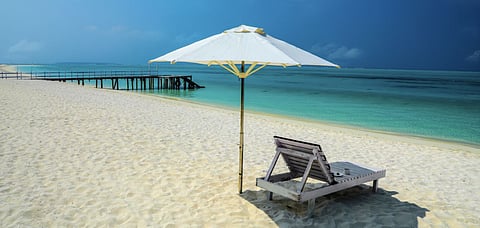
- Destinations
- Experiences
- Stay
- What's new
- Editor’s Picks
- Responsible Tourism
- CampaignsCampaigns
- Subscribe

Minicoy Thundi Beach and Kadmat Beach in India&rsquos Lakshadweep Islands are the latest in the country to get the prestigious international eco-label, &lsquoBlue Flag&rsquo. The certification is awarded by an international body, the Foundation for Environmental Education (FEE).
The announcement was recently made by the Union Ministry of Environment, Forest and Climate Change (MoEFCC).
While the Kadmat Beach has been popular for its water sports which draws many cruise tourists, the white sand Thundi beach is better known for its lagoons which are swimmers&rsquo delight.
The Blue Flag is considered one of the world&rsquos most recognised voluntary eco-labels awarded to beaches, marinas, and sustainable boating tourism operators. To receive and certification and maintain it too, these beaches have to follow a series of criteria, including stringent environmental, educational, safety, and accessibility norms.
In 2020, eight Indian beaches were the first in India to receive the certification. These were Golden Beach (Puri) of Odisha, Radhanagar Beach (Swaraj Dweep) in the Andaman Island, Rushikonda (Vishkhapatnam) in Andhra Pradesh, Kappad (Kozhikode) in Kerala, Kasarkod (Uttar Kannada) and Padubidri (Udupi) in Karnataka, Ghogla in Diu, and Shivrajpur (Dwarka) in Gujarat.
In 2021, while the eight beaches were re-certified, they were joined by two more &ndash Kovalam in Chennai (Tamil Nadu) and Eden Beach in Puducherry (Puducherry).
According to Blue Flag&rsquos global website, the main aim of the programme is to connect the public with their surroundings and encourage them to learn more about their environment. It also requires that the certified beaches &lsquomust offer environmental education activities and promote a permanent display of information relevant to the site in terms of biodiversity, ecosystems and environmental phenomena&rsquo.
Incidentally, in 2020, India also launched the country&rsquos own eco-label BEAMS (Beach Environment & Aesthetics Management Services) under its Integrated Coastal Zone Management (ICZM) project. The programme focuses on preventing pollution of coastal waters, sustainable development of beach facilities, protection and conservation of coastal ecosystems and natural resources, and ensuring local authorities and stakeholders maintain high standards of cleanliness, hygiene & safety for beachgoers in accordance with coastal environment & regulations.
With Blue Flag beaches considered to be the cleanest beaches in the world, they attract a lot of travellers too. However, it is advisable not to litter the beaches but follow the rules to ensure that the beaches are garbage and pollution free.
